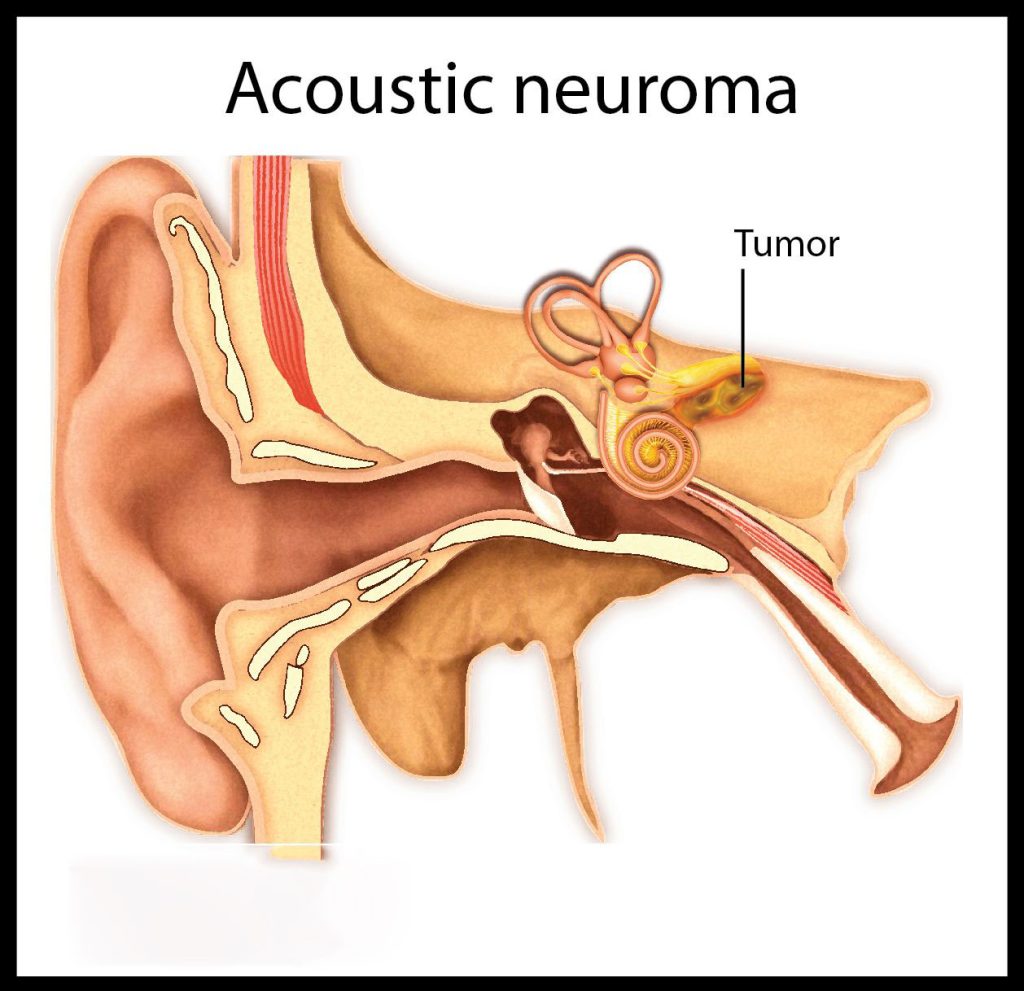
Acoustic Neuroma

Acoustic neuroma, also known as vestibular schwannoma, is a noncancerous and usually slow-growing tumor that develops on the main (vestibular) nerve leading from your inner ear to your brain. Branches of this nerve directly influence your balance and hearing, and pressure from an acoustic neuroma can cause hearing loss, ringing in your ear and unsteadiness. Acoustic neuroma usually arises from the Schwann cells covering this nerve and grows slowly or not at all. Rarely, it may grow rapidly and become large enough to press against the brain and interfere with vital functions. Treatments for acoustic neuroma include regular monitoring, radiation and surgical removal.
Symptoms
Signs and symptoms of acoustic neuroma are often subtle and may take many years to develop. They usually arise from the tumor’s effects on the hearing and balance nerves. Pressure from the tumor on adjacent nerves controlling facial muscles and sensation (facial and trigeminal nerves), nearby blood vessels, or brain structures may also cause problems.
As the tumor grows, it may be more likely to cause more noticeable or severe signs and symptoms.
Common signs and symptoms of acoustic neuroma include:
• Hearing loss, usually gradual — although in some cases sudden — and occurring on only one side or more pronounced on one side
• Ringing (tinnitus) in the affected ear
• Unsteadiness, loss of balance
• Dizziness (vertigo)
• Facial numbness and very rarely, weakness or loss of muscle movement
In rare cases, an acoustic neuroma may grow large enough to compress the brainstem and become life-threatening.
Causes
The cause of acoustic neuromas appears to be a malfunctioning gene on chromosome 22. Normally, this gene produces a tumor suppressor protein that helps control the growth of Schwann cells covering the nerves.
What makes this gene malfunction isn’t clear, and in most cases of acoustic neuroma, there is no identifiable cause. This faulty gene is also inherited in neurofibromatosis type 2, a rare disorder that usually involves the growth of tumors on balance nerves on both sides of your head (bilateral vestibular schwannomas).
Risk factors
Neurofibromatosis type 2
The only confirmed risk factor for acoustic neuroma is having a parent with the rare genetic disorder neurofibromatosis type 2. But neurofibromatosis type 2 only accounts for about 5 percent of acoustic neuroma cases.
A hallmark characteristic of neurofibromatosis type 2 is the development of noncancerous tumors on the balance nerves on both sides of your head, as well as on other nerves.
Neurofibromatosis type 2 (NF2) is known as an autosomal dominant disorder, meaning that the mutation can be passed on by just one parent (dominant gene). Each child of an affected parent has a 50-50 chance of inheriting it.
Complications
An acoustic neuroma may cause a variety of permanent complications, including:
• Hearing loss
• Facial numbness and weakness
• Difficulties with balance
• Ringing in the ear
Large tumors may press on your brainstem, preventing the normal flow of fluid between your brain and spinal cord (cerebrospinal fluid). In this case, fluid can build up in your head (hydrocephalus), increasing the pressure inside your skull.
